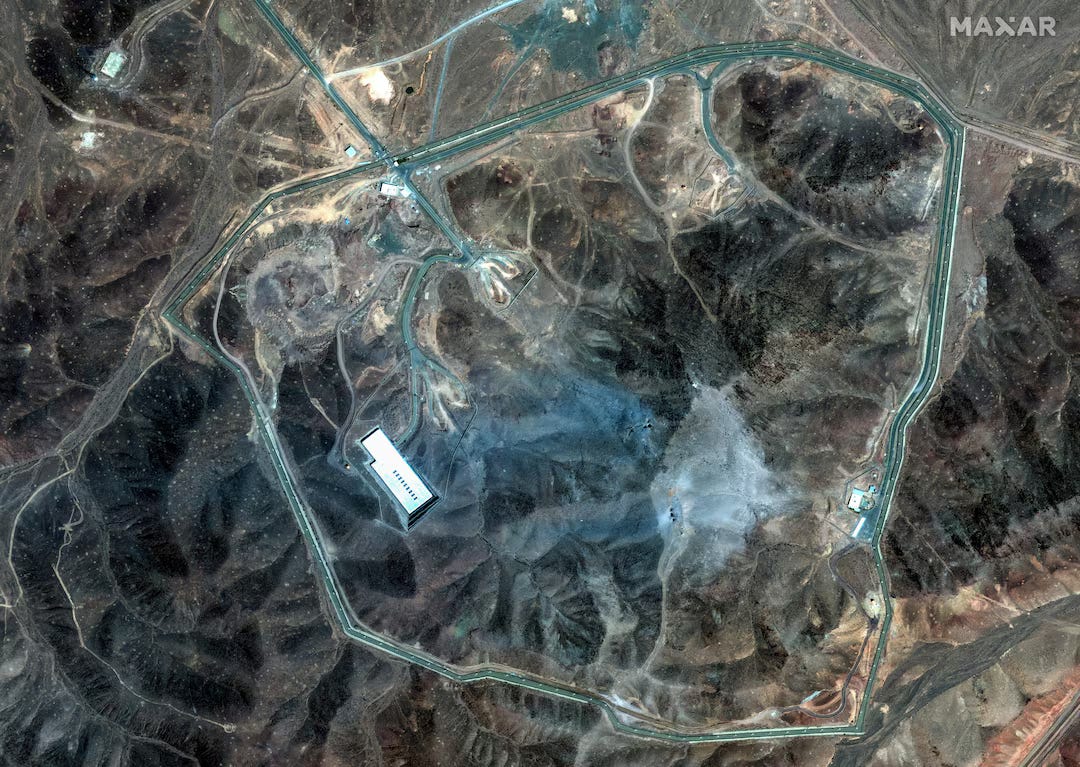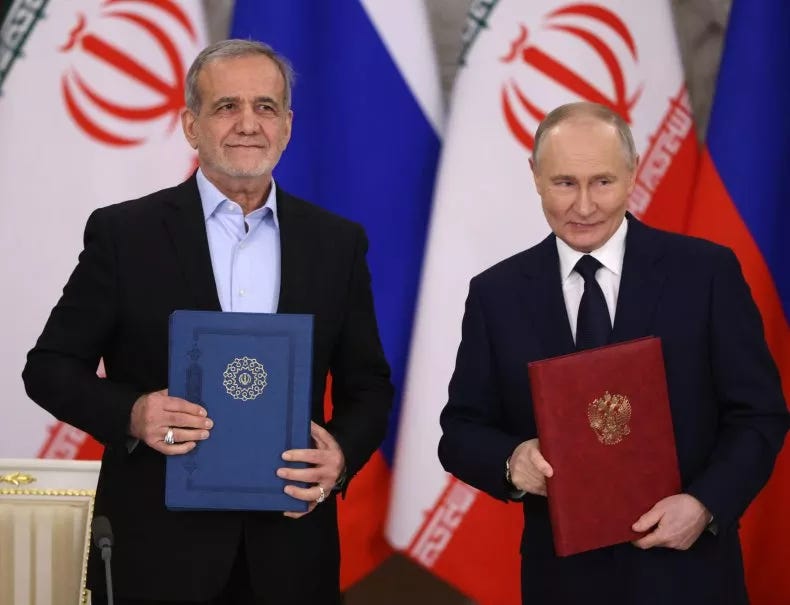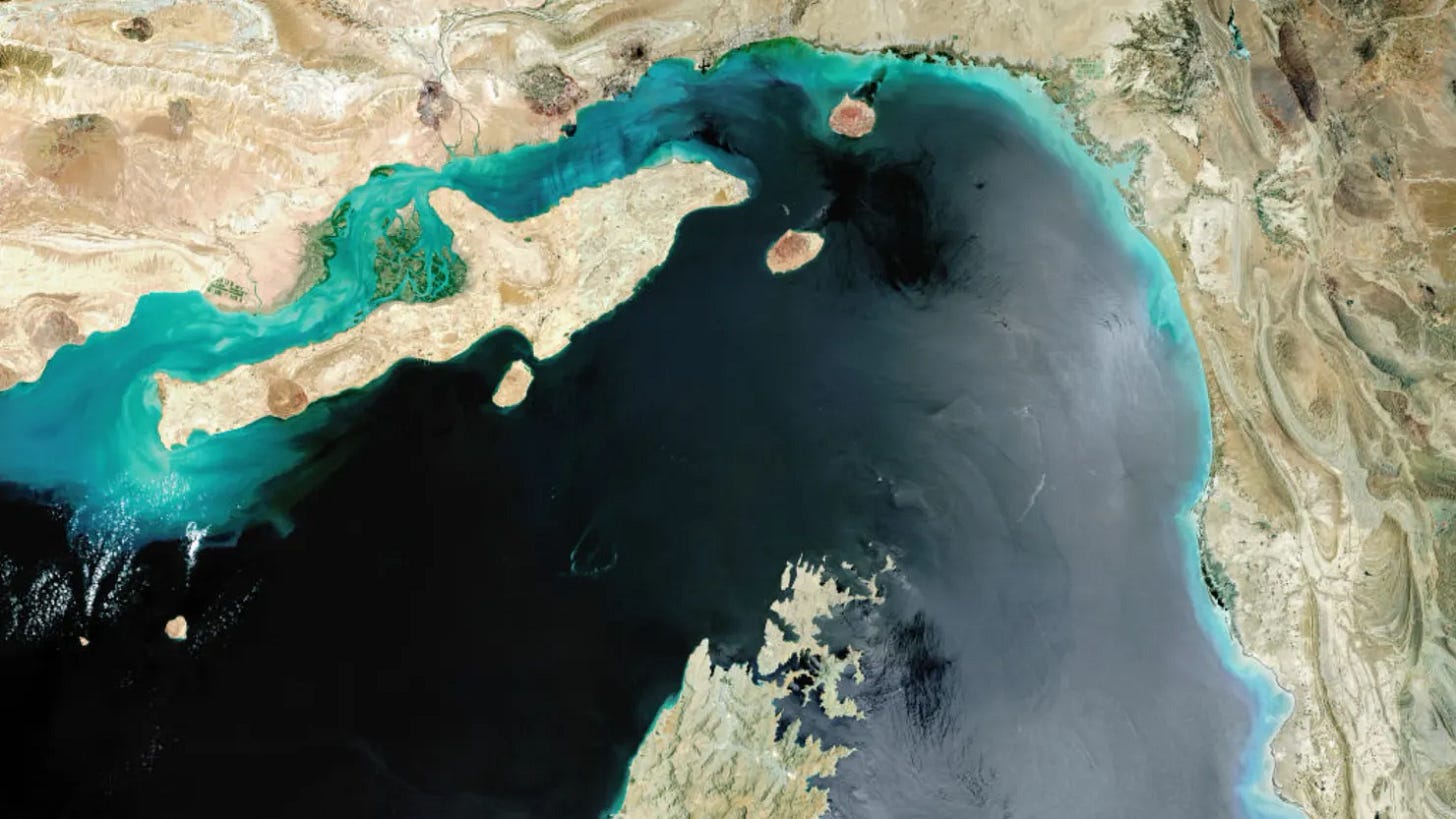Iran’s Allies Sent Thoughts and Prayers
But no actual assistance
Together with:
As American bunker-buster bombs pounded Iran's nuclear facilities, Russian President Vladimir Putin was securing Israeli assurances that Moscow's workers at Iran’s Bushehr power plant — Iran’s only nuclear plant, run with Russian assistance — would remain untouched. The moment crystallized Putin's predicament perfectly: caught between his strategic partnership with Iran and his desire to maintain relevance in a Middle East increasingly beyond his control.
When Iranian Foreign Minister Abbas Araghchi flew to Moscow on Sunday seeking concrete support, the Russian government’s response was telling in its limitedness. "The absolutely unprovoked aggression against Iran has no basis and no justification," Putin declared, adding that, "for our part, we are making efforts to assist the Iranian people." But when pressed on specifics, Kremlin spokesman Dmitry Peskov sidestepped questions about arms supplies, focusing instead on "mediation efforts" and diplomatic statements. Iran’s other great power ally, China, seemed no more likely to come to its aid.
Former Russian Prime Minister Dmitry Medvedev did claim yesterday on social media that "a number of countries are ready to directly supply Iran with their own nuclear warheads," but he quickly retreated. Trump fired back on Truth Social with a mix of incredulity and his own nuclear saber-rattling. "Did he really say that or, is it just a figment of my imagination?" Trump asked, chiding Medvedev that the "N word" — which he specified stood for "Nuclear" — "should not be treated so casually." Trump then boasted that America's nuclear submarines are "the most powerful and lethal weapons ever built." Faced with this pushback, Medvedev clarified that "Russia has no intention of supplying nuclear weapons to Iran."
Trump later announced on social media that Iran and Israel had agreed to a ceasefire. But whether or not it holds, and whether or not Iran and Israel have actually made a pact, the war has revealed limits on how much Iran can count on its most important state ally. For all of Moscow's bluster about defending Iran, the harsh reality is that Russia is playing an increasingly weak hand. Its military is stretched thin in Ukraine and its challenge to American global leadership is crumbling. What we're witnessing isn't Russian strength, but the exposure of profound limitations that have implications far beyond the Israel–Iran war.
The limits of the Russia–Iran partnership
Russia’s relationship with Iran has always been more transactional than friendly. A “strategic partnership” agreement the two countries signed just months ago contains no mutual defense clause — an omission that speaks volumes about the shallow nature of their alliance.
Putin's careful balancing act reflects deeper constraints. As he explained Friday at the St. Petersburg Economic Forum, "almost two million people from the former Soviet Union and the Russian Federation reside in Israel. It is almost a Russian-speaking country today. And, undoubtedly, we always take this into account." This demographic reality forces Moscow to walk a tightrope between supporting Iran and maintaining relationships with Israel and the Russian diaspora living there — a balance that has so far favored restraint over confrontation.
The economic calculations are also stark. Russia, a major oil exporter, benefits short term from oil price spikes caused by Middle East instability — a welcome boost to war-strained budgets. But regime change in Iran would devastate long-term Russian investments there, in everything from a network of ship, rail, and road routes moving freight between Europe, Russia, and Iran to nuclear reactor construction already taking place inside Iran. Putin is essentially playing day trader while hoping his long-term portfolio survives.
Putin's Iran predicament exposes the hollowness of alliances when subjected to real pressure. Russian calls for supporting Iran remained just that — calls without action. As one segment on Russian state television acknowledged, Moscow needed to manage "inflated expectations" about its support, and its obligation was merely "to not assist the aggressor" — hardly the robust defense Tehran expected from its strategic partner.
From Ground News:
So many people want to know: Were the US strikes on Iran the right or wrong move? The answer you get depends on who you ask.
With over 240 sources covering this story, Ground News is the most practical solution to exposing spin before we mistake it for fact.
If you like The Preamble, you’ll love their app and website. It gathers the world’s perspective on the most polarizing issues and then breaks down each source’s bias and factuality. Their Blindspot Feed is proof that news isn’t just reported – narratives are crafted by partisan outlets we mistake as “unbiased.”
Ground News is nonpartisan and independently funded by readers like you.
Subscribe now for 40% off the same unlimited Vantage plan I use. Subscribe now at ground.news/preamble.
Trump's leverage and Putin's miscalculation
Putin offered to mediate between Israel and Iran, but Trump's blunt rejection — “Do me a favor, mediate your own. Let's mediate Russia first” — was a reminder of how thoroughly the Ukraine war has drained Moscow's capacity for global power projection.
Putin's army is fighting a major war of attrition in Ukraine, leaving little capacity for additional confrontations. As Hanna Notte at the Center for Strategic and International Studies observed, "Russia has a clear priority, which it pursues facing clear resource constraints: subjugating Ukraine and revising the security architecture in Europe."
Russia's dependencies have shifted revealingly. While Iran once supplied crucial drones for the Ukraine war, Moscow has increasingly turned to North Korea — not just for weapons, but also for the soldiers Kim Jong Un has sent to fight on Russia’s front lines. This pivot demonstrates that Russia's strategic calculations now prioritize the North Korean partnership over Iranian ties.
For Trump, Putin's weakness creates opportunity. Putin's inability to protect his closest Middle Eastern ally demonstrated the limits of Russian power projection beyond its immediate periphery. Trump can push harder on Ukraine, confident that Putin's resources and attention are strained.
Meanwhile, Iranian sources told Reuters they felt "betrayed by major powers such as Russia and China" and believed Russia had "not done enough to support it."
What about China?
China condemned the strikes with typical diplomatic language — calling them moves that "exacerbate tensions in the Middle East" — but offered no concrete military or political support. China does not want a prolonged war in the region. The reason is simple arithmetic: China imports 5.4 million barrels of crude daily through the Strait of Hormuz, equivalent to half of China's total oil imports. The last thing China wants is a closure of the strait — a 21-mile-wide waterway, separating Iran from the Arabian Peninsula, through which nearly 30 percent of the world's oil flows — whether by Iranian retaliation or regional instability.
Secretary of State Marco Rubio called on China to discourage Iran from closing the strait, noting that “they heavily depend on the Straits of Hormuz for their oil." China purchases 90% of Iran's oil exports according to data from the commodities firm Kpler, simultaneously making Tehran dependent on Chinese markets and Beijing vulnerable to Iranian retaliation strategies. This economic interdependence is the best explanation of China’s reticence.
Beijing has also been content to watch Washington expend resources in regional conflicts while China focuses on its primary strategic competition with the United States in the Indo-Pacific. From China’s point of view, Iran's crisis is mainly America’s and Russia's problem; its own priority is protecting its energy supplies and avoiding unnecessary confrontation.
Implications for American policy
For the US, this moment reveals how thoroughly its adversaries have overextended themselves. Russia's inability to meaningfully support Iran while fighting in Ukraine demonstrates the limits of Moscow's global reach. Putin's de facto neutrality — describing efforts to "assist the Iranian people" while refusing concrete military aid — shows how resource constraints have forced painful choices between competing strategic priorities. Beijing's muted response illuminates the fundamental economics that drive its foreign policy decisions, even with allies.
The broader lesson extends beyond current conflicts: partnerships based on shared grievances against American power prove inadequate substitutes for actual military capability and shared geopolitical goals. Iran's isolation, despite years of building alliances, demonstrates that effective power projection requires commitments Russia and China aren't prepared to make when their partners face existential threats.
Putin's involvement in the Israel–Iran war reveals the gap between alliances and strategic reality. For Trump, recognizing and exploiting this gap could prove crucial not just for Middle East policy, but for ending the war in Ukraine and the broader challenge of managing great power competition. Sometimes the most important strategic insights come not from what adversaries threaten to do, but from what they cannot — or will not — do when their commitments are tested by American resolve.










This analysis of how Russia and China’s competing priorities left Iran essentially abandoned is really valuable context that’s been missing from most coverage. The economic interdependencies you lay out (especially China’s reliance on the Strait of Hormuz and Russia’s investments in Iran versus their diaspora in Israel) explain so much more than the usual “axis of evil” framing we get. Thank you, Elise!
But I keep coming back to this assumption that Trump is going to strategically exploit Putin’s weakness in some coherent way. Everything we’ve seen lately suggests his decision-making is way more reactive and personal than strategic. Just look at the immigration flip-flop when his business friends complained about raids affecting their sectors (and then flip-flopping again based on no new information), or how his position on the Iran strikes shifted completely once he saw Fox praising Netanyahu’s “strength” and wanted that same praise for himself.
The real wild card isn’t whether Trump recognizes these geopolitical opportunities you’ve identified, it’s whether his response will be based on actual strategic thinking or just whoever gets to him last with the right flattery. Putin’s constraints are real and create openings, but Trump’s constraints might be even weirder: he’s operating on ego and personal relationships rather than national interests.
And here’s what really gets me: by backing Israel’s strikes, Trump just threw a huge chunk of his base under the bus. The same people who voted for him as the “no new wars” candidate are now talking impeachment because he’s cheerleading military action that couldn’t align less with what they thought they were getting. If he’s willing to betray that vocal part of his coalition just to satisfy what seems like a few days of Israeli military FOMO, what does that tell us about his capacity for the kind of long-term strategic thinking your analysis assumes? So while this framework for understanding the power dynamics is spot on, predicting what Trump does with it feels impossible when his positions change based on his mood and who’s whispering in his ear that week.
Well this is a great article that has me thinking. It seems the move with Iran could have favorable geopolitical consequences to the US regarding Russia and China. I am uncomfortable acknowledging it because I don’t have confidence that the decision to attack was any kind of 4D chess move like that. But yet if it somehow was, it just makes it seem like Middle Eastern countries continue to be pawns for larger world powers to use for other purposes, which doesn’t feel great either. Yet again, the Preamble reminds us all that everything has nuance to consider.